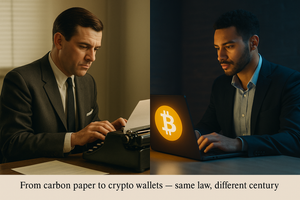There’s a special South African genius for making the future feel like the past. Where else could a borderless digital currency, created by a pseudonymous cyberpunk in 2009, find itself in a legal fistfight with a set of regulations drafted when the Beatles were still in high school?
The issue is the South African Reserve Bank’s exchange control regulations, which are vintage 1961. This was back when Harold Macmillan was talking about winds of change, which had echoes here; the restrictions were imposed because the apartheid government sensed the danger of capital flight after the Sharpeville massacre.
So, if a racist government imposed exchange controls to prevent people from moving assets out of the country, why would they still exist 30 years into the democratic era? The SA Reserve Bank argues that, well, the fickle nature of the international financial environment requires the exchange control system to allow for swift responses to economic changes. Internationally, exchange controls are justified because they can help prevent rapid depletion of reserves by curbing capital flight or speculative currency attacks.
That is true, for what it's worth. But it's also true that generally exchange controls prevent the externalisation of assets if, say, the people with the assets happen to worry they are going to be fleeced by a hostile government for political (or corrupt) reasons.
In South Africa, whatever the Reserve Bank says, the honest political reason why they still exist is because the ANC fears if it opens the door, middle-class people will divest in a rush, which will move the assets out of its reach and control. This will prevent it from taxing that same middle class into penury, which is the current plan. SA’s tax rates are at levels comparable to rich countries, but the level of services government provides in exchange is lower than in many poor countries.
Hence, there has historically been big pressure from richer South Africans to oppose exchange controls and a resistance to the idea by political parties who favour tax-and-spend systems of politics, of which our government is an especially enthusiastic supporter. But to be fair, government has tried to ease this pressure by periodically increasing the savings South Africans can invest outside the country.
It must be said that, on an objective basis, exchange controls are simply a bad idea, and that applies whether you are rich or poor. Controls distort price signals, create black markets, and they encourage corruption. Artificially fixed exchange rates often overvalue currencies, which harms exports and incentivises under-the-table transactions. As a result, most countries have gravitated toward light exchange controls, if they have them at all. Having exchange controls is now something of a mark of being an economic troglodyte nation, which is why Venezuela, Cuba and Zimbabwe are the most enthusiastic exchange controller comrades internationally.
So that's the background. But now throw into the mix cryptocurrency.
Even if you believe exchange controls are sensible, you need a policing mechanism, meaning there is a whole department at the Reserve Bank theoretically checking the movement of money. And then there are the brutal regulations to try to “manage” these flows, one of which is that if you contravene exchange controls, your cash can be snatched by the Reserve Bank.
Bitcoin has created a fabulous challenge to exchange controls, and you might imagine that the Reserve Bank is kinda worried about it. It was one thing when Bitcoin was a weirdo, geek toy, but now it has a market cap of $2.31 trillion, which is five times the size of the entire South African economy. So can’t you just buy Bitcoin in SA and sell it in Singapore? You would think exchange controls would prevent that, but in fact you can - legally. Possibly legally. It's a grey area.
The reason it's possibly legal is because of a case in the Gauteng division of the High Court, Standard Bank v SARB. What happened in the case is that the bank lent R40-million to a Rustenburg retailer. The retailer went bust, but not before the owners bought a whole bunch of Bitcoin. This was bad news for Standard, but worse, since the Reserve Bank discovered that the owners of the retailers had been moving money out of the country with the cryptocurrency, they claimed what remained in the accounts of the retailers.
One of Standard’s arguments against the forfeiture was that Bitcoin is not actually “currency” as defined by exchange control legislation. The regulation refers to“currency”, “gold” and “securities”, but not Bitcoin. Counsel for Standard pointed out that cryptocurrency is neither currency nor a legal tender in SA, and that effectively there is a regulatory lacuna.
The court agreed with this, really on the basis that any law which carries criminal penalties should be specific, and the court invoked the principle that when the law is vague, freedom wins. You cannot stretch an old law like a rubber band around something it was never meant to hold - at least not without snapping the Constitution in the process. But furthermore, the court found, “Cryptocurrency is not money. The construction that cryptocurrency is money, by looking at the definition of money which includes foreign currency, is strained and impractical. If cryptocurrency were money, then the crypto wallets would be attached in terms of Reg 22B”. (That’s the regulation which says when SARB reasonably suspects that money or goods are connected to an exchange-control contravention, they may issue a Notice and Order of Forfeiture”`).
So, as it stands at the moment, Bitcoin is not subject to exchange controls. Bet you didn’t know that. 💥
For paying customers, in the remainder of this piece, I have included a short bit of speculation about what will happen now. If you are not subscribed, please do - as I keep saying, in order to keep doing this I need to keep the hearth fires burning, and its as cheap as chips - cheaper than chips as it happens!
